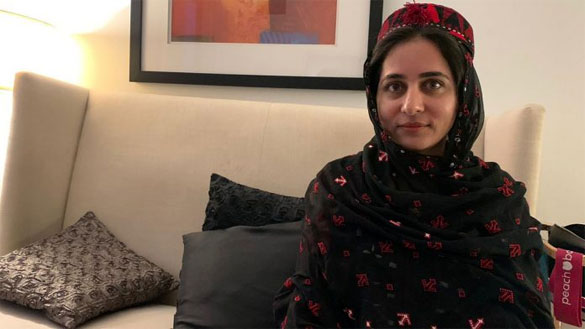New Age Islam Special Correspondent
23 December 2020

Activist Karima Baloch | Twitter | @KarimaBaloch
------
Karima Baloch, the face of the feminist movement in Balochistan, Pakistan was found dead in Toronto in mysterious circumstances. She had gone missing on Sunday. On Tuesday her dead body was found by the local police. But the Toronto police has termed her death as non-criminal. It raises some serious questions.
She was living in exile in Toronto, Canada like many other human rights activists, dissidents and journalists who wrote and spoke against the atrocities perpetrated by the Pakistani army and government against the Baloch people and feared for their life in their own country.
Karima was among the 100 most influencial women of the world named by the BBC in 2016 and had raised the issue of persecution of Baloch people, including women and children in the Union Nations.
She had also sought India's PM Narendra Modi's help in this regard and had wished him on 'Raksha Bandhan'.
She is not the first Baloch activist to die mysteriously. Sajid Baloch, a journalist and a Baloch rights activist from Balochistan died in mysterious circumstances in Sweden in April 2019 after his diappearance on 2 March 2019. He was also an eyesore of the Pakistan government as he had written a series of reports on human rights violations and forced disappearances in Balochistan. After getting threats he sought asylum in Sweden and had been living there since 2017.
But in April, 2019, he was found dead in the Fyris river in Canada. The Sweden police started murder investigation but later closed the case as non-criminal death. They said his death might be a suicide or due to an accident.
The striking similarity in the deaths of Karima and Sajid and the opinions of the police in Canada and Sweden hint at a deeper conspiracy.
Both the deceased were activists working against the interests of the Pakistan government and the governments of their adopted countries knew that there life was under threat. The European governments are also well aware of the fact that Pakistani secret service is active there. The role of the secret service of China in their disappearance and death cannot be ruled out because China has built the Gwador Port in Balochistan and has its huge investments in Balochistan. Baloch people have been protesting against their deprivation of their share in the natural resources of Balochistan and employment opportunities. . Therefore, the activists and journalists have also been working against the interests of China in Balochistan.
But the attitude and the way of handling of the European countries of the issue of the asylum seekers and refugees taking shelter there raises serious questions on their policy on human rights and on the protection of refugees in their countries.
Karima Baloch had not only raised the issue of the atrocities on Baloch people by the Pakistan government and securitg forces in the UN but also infuriated them by seeking help from their arch enemy India's PM Narendra Modi. How can the governments of Sweden and Canada term her death as non-criminal and close the case?
If this happens, the European countries will become killing fields of Pakistani and Chinese secret services. It will deliver a severe blow to the fight against human rights violations by oppressive governments and security establishments. It's in the interest of the global human rights movement that the deaths of Karima Baloch and Sajid Baloch be re-investigated and the culprits should be brought to book.
New Age Islam, Islam Online, Islamic Website, African Muslim News, Arab World News, South Asia News, Indian Muslim News, World Muslim News, Women in Islam, Islamic Feminism, Arab Women, Women In Arab, Islamophobia in America, Muslim Women in West, Islam Women and Feminism

No comments:
Post a Comment